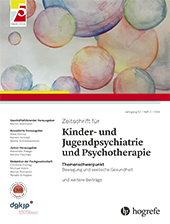Multisystemische Therapie (MST) für Jugendliche mit schweren Störungen des Sozialverhaltens
Ökonomische Evaluation der Implementierung im deutschsprachigen Raum
Abstract
Fragestellung: Das in den USA entwickelte Therapieprogramm der Multisystemischen Therapie (MST) wurde für den deutschsprachigen Raum adaptiert und erstmals bei 70 Jugendlichen angewendet. Es wurde die Frage untersucht, ob von der Anwendung der MST Einsparungseffekte gegenüber anderen Maßnahmen zu erwarten sind. Methodik: Um neben den Prozess- und Ergebnisaspekten der therapeutischen Intervention auch allfällige ökonomische Effekte der MST beurteilen zu können, wurden jene Fachpersonen, die die Jugendlichen in die MST zugewiesen hatten danach befragt, welcher Behandlungsweg ihrer Meinung nach ohne MST wahrscheinlich gewesen wäre. Die Kostenfolgen dieser Behandlungswege wurden ermittelt und den tatsächlichen Kosten der MST gegenübergestellt. Ergebnisse: Die ökonomische Evaluation der Implementierung der MST im deutschsprachigen Raum zeigte ein deutliches Einsparungspotenzial durch diese ambulante Therapieform: Die Fallkosten für die Durchführung der MST lagen um 40 % bis 64 % unter den Kosten für außerfamiliäre Platzierungen, die nach Einschätzung der ZuweiserInnen ohne MST erforderlich gewesen wären. Schlussfolgerungen: Bei der Multisystemischen Therapie handelt es sich nicht nur um ein effektives, sondern auch um ein relativ kostengünstiges Verfahren zu Behandlung von Jugendlichen mit schweren Störungen des Sozialverhaltens.
Objective: Multisystemic Therapy (MST) was adapted for implementation in a German-speaking environment. The study evaluates the possible economic effects of MST. Method: Professionals who recommended MST for youths with severe conduct disorders were asked to evaluate the probability of other forms of interventions if MST had not been used. We investigated the costs of those other forms of treatment and compared them to the costs that had actually been incurred with MST. Results: Implementation of MST in a German-speaking environment showed a significant potential of cost savings compared to other intervention methods. The costs of MST per case were between 40 % and 64 % lower than these of standard interventions. Conclusions: MST is not only an effective, but also a cost-efficient form of evidence-based treatment for youths with severe conduct disorders.
Literatur
(2006). Evidence-based public policy options to reduce future prison construction, criminal justice costs, and crime rates. Olympia: Washington State Institute for Public Policy.
(2001). The comparative costs and benefits of programs to reduce crime. Olympia: Washington State Institute for Public Policy.
(2002). Four-year follow-up of multisystemic therapy with substance-abusing and substance-dependent juvenile offenders. Journal of the American Academy of Child and Adolescent Psychiatry, 41, 868–874.
(1997). Multisystemic therapy with violent and chronic juvenile offenders and their families: The role of treatment fidelity in successful dissemination. Journal of Consulting and Clinical Psychology, 65, 821–833.
(1992). Family preservation using multisystemic therapy: An effective alternative to incarcerating serious juvenile offenders. Journal of Consulting and Clinical Psychology, 60, 953–961.
(1999). Multisystemic treatment of substance abusing and dependent delinquents: Outcomes, treatment fidelity, and transportability. Mental Health Services Research, 1, 171–184.
(2007). Multisystemic treatment of serious clinical problems in youths and their families. In , Handbook of forensic mental health for victims and offenders: Assessment, treatment, and research (pp. 315–346). New York: Springer Publishing Company.
(2005). Multisystemic therapy for social, emotional and behavioural problems in youth aged 10–17. Kopenhagen: The Nordic Campbell Center.
. (2008). MST Data Report. Online unter www.mstinstitute.org/2008%20MST%20Data%20Report_Final.pdf
(
2005 ). Multisystemic treatment of serious behaviour problems und youth: Sustainability of effectiveness two years after intake. Accepted for publication in Child and Adolescent Mental Health.(2011). Multisystemische Therapie (MST) für Jugendliche mit schweren Störungen des Sozialverhaltens – Implementierung im deutschsprachigen Raum und erste Ergebnisse. Zeitschrift für Kinder- und Jugendpsychiatrie und Psychotherapie, 39, 33–39.
(2005). Long-term follow-up to a randomized clinical trial of multisystemic therapy with serious and violent juvenile offenders. Journal of Consulting and Clinical Psychology, 73, 445–453.
(2000). Multisystemic therapy: Monitoring treatment fidelity. Family Process, 39, 83–103.



